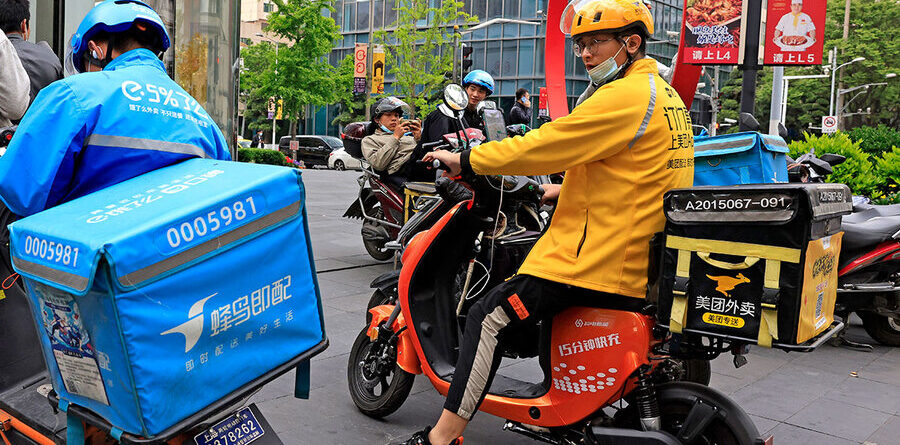Demanding dignity for delivery drivers in China’s precarious gig economy
In August 2024, a viral video from Hangzhou showed a delivery driver kneeling before a security guard after being fined for scaling a fence to save time. The incident ignited protests among delivery riders, exposing the exploitation embedded in China’s food delivery industry.
This moment, combined with the release of Upstream, a Chinese blockbuster highlighting the struggles of gig workers, has intensified public discussion about the plight of the 12 million Chinese delivery riders navigating precarious conditions. Their challenges expose deeper structural issues in China’s gig economy, an emblematic feature of the country’s post-pandemic economic malaise.
The transition from labour-intensive manufacturing to a knowledge-based digital economy has challenged China’s long-standing reliance on a vast pool of low-cost labour. The COVID-19 pandemic exacerbated this shift, resulting in mass unemployment, particularly among workers in traditional manufacturing industries. As factories closed and jobs disappeared, many individuals — especially young people — struggled to secure suitable employment, turning to gig economy platforms like Meituan and Ele.me for survival. This influx underscores not only an economic distress but also the systemic inequalities that leave these workers vulnerable.
A key factor exacerbating the plight of delivery workers is China’s hukou system, which enforces a dual urban–rural structure. This system restricts rural migrants from enjoying the same rights and access to public services as their urban counterparts. Many migrant delivery riders lack access to essential services such as housing, healthcare and education. They are forced to rely on gig platforms to make a living, often at the cost of their dignity and well-being.
While the Chinese government has made some efforts to reform protections for these workers, significant changes are still necessary to uphold their fundamental rights. Platform companies use stringent algorithms that prioritise efficiency and profit over worker welfare, creating a stressful environment and leading to high accident and fatality rates due to overwork.
With more individuals entering the field as a result of the pandemic, competition has skyrocketed, pushing down wages and increasing workloads. Riders may earn as little as one yuan (14 US cents) per delivery, a clear illustration of the exploitative conditions they endure.
The exploitation of delivery workers is not merely a result of corporate greed, it is also shaped by the broader socio-economic context in China. Platform companies employ predatory algorithms designed to maximise efficiency and minimise costs, responding to consumer expectations for cheap and rapid delivery services. Chinese consumers increasingly demand high-quality, low-cost services, which pressures platforms to deliver at the lowest possible fees, creating a race to the bottom among platforms. This competition shifts the risks and burdens onto workers, who bear the consequences of these relentless pressures.
The gig economy thrives on the premise of flexibility and independence, but many riders face a precarious existence. Often classified as independent contractors, workers lack access to benefits, job security and workplace protections. This informal status leaves riders vulnerable to arbitrary decisions made by platform operators, who can impose penalties for delays or performance issues without accountability.
The Chinese government has recently implemented policies aimed at improving conditions for riders. These measures include imposing fines on platforms for failing to provide adequate working conditions, restricting harsh algorithms and encouraging riders to join unions. Initiatives such as establishing ‘resting stations’ for riders in cities like Shanghai provide essential spaces for recovery and socialisation.
But these efforts are often piecemeal and cautious. While the government seeks to promote platform growth to create jobs amid rising unemployment, it also aims to protect workers’ rights and prevent exploitation. The prevailing sentiment seems to be that providing job opportunities, even in the gig economy, is better than allowing widespread unemployment to take hold.
The tension between economic growth and worker protection is emblematic of a larger global trend amid a rapidly evolving labour market. Policymakers must strike a balance that encourages innovation while ensuring that workers are treated fairly. Immediate action is necessary to protect delivery workers from further exploitation. Platforms must be compelled to raise compensation levels, implement better working conditions and reform their algorithmic management systems to be more humane.
Addressing this issue requires engaging the public and users of these platforms and raising their awareness of social equity. Consumer expectations may evolve to demand higher quality, reliability and transparency in the gig economy. Such shifts could influence how businesses operate, compelling platforms to adopt more equitable practices.
China must establish a long-term comprehensive social security framework that aligns with the realities of the digital economy and platform labour. This framework should address health insurance, pensions and paid leave for gig workers, and create a more equitable labour market with protections for all workers, regardless of employment status.
The road ahead will be challenging, but acknowledging the dignity of gig workers and advocating for meaningful reforms can lead to a system that values all workers’ contributions. The evolving labour market must prioritise individual welfare over the pursuit of profit. The time for action is now — the voices of delivery workers must be heard, and their rights championed. Only through a collective effort from consumers, businesses and policymakers can a more equitable future for all involved in the gig economy be achieved.
Hui Huang is Assistant Professor at the Department of Public Economics and Social Policy, Shanghai Jiao Tong University and Research Associate at the School of Social Science and Public policy, King’s College London. His research primarily focuses on how digital technologies, represented by artificial intelligence and algorithms, impact employment and the corresponding policy responses.
Read more @eastasiaforum











